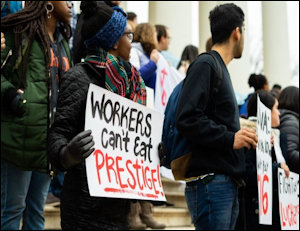
Demonstrators backing the Living Wage in a rally outside the Rotunda earlier this month. Photo credit: Cavalier Daily
I’ll give the University of Virginia credit for raising the minimum wage it pays its employees to $15 an hour. The University is putting its money where its proverbial mouth is. It doesn’t just preach social justice for others — it practices its version of social justice itself.
It turns out that increasing the minimum wage for 1,400 employees on the Grounds is a bit trickier than envisioned, however. As the Cavalier Daily reports, “a variety of legal barriers may complicate that endeavor for those who are employed by external contractors rather than the University itself.” UVa President Jim Ryan said the increase, which will go into full effect Jan.1, 2020, will apply to only 60% of full-time employees who earn less than $15 an hour. But the university is working to extend the same wage to outside contractors. Said Ryan: “This is legally and logistically more complicated, but our goal is to make it happen.”
Raising the minimum wage creates a secondary problem known as wage compression, reducing the wage premium for those with greater skills, seniority or responsibility earning about $15 an hour. To compensate, UVa will raise wages for about 700 other employees. All told, the minimum-wage initiative will cost the University about $4 million.
Bacon’s bottom line: I adamantly oppose state-mandated increases to the minimum wage. But if UVa makes a voluntary decision to boost its pay to lower-income employees, that’s fine with me. Personally, I think pay raises should be connected to productivity and merit rather than dispensed wholesale, but that’s a personal preference. In a free economy, UVa should be allowed to create a compensation system that reflects its own values and priorities.
Approving of UVa’s minimum wage is not the same as approving of a state-mandated minimum wage. UVa enjoys an envious position in the marketplace that other employers do not. UVa has the pricing power to pass along higher labor costs to its customers — its students — in the form of higher tuition, fees and charges. That may cause a problem for lower-income students who have to go deeper into student-loan debt in order to attend the university, but they comprise a largely invisible constituency.
Let’s face it, being a UVa administrator or tenured professor is the epitomy of white privilege. Only 18.6% of the faculty is classified as minority, according UVA’s Diversity Dashboard, and that includes blacks, Hispanics, Asians, and others. The percentage of minorities on staff is about the same at 19.0%. But it’s a good bet that whites predominate the upper echelons of the administrative staff while minorities predominate in the lower paid occupations. Not only do tenured faculty and higher-level staff jobs pay well, they are sinecures. Once you’re in, you stay in. Raising the minimum wage for lower-income employees allows UVa’s top dogs to feel virtuous even as they pass on the costs to others.
But the larger point is this: UVa can afford pay practices that, say, the manager of a McDonald’s franchise or a JC Penneys could not dream of. No low-income worker will lose his job because UVa was forced to pay him more than he could contribute in economic value.


